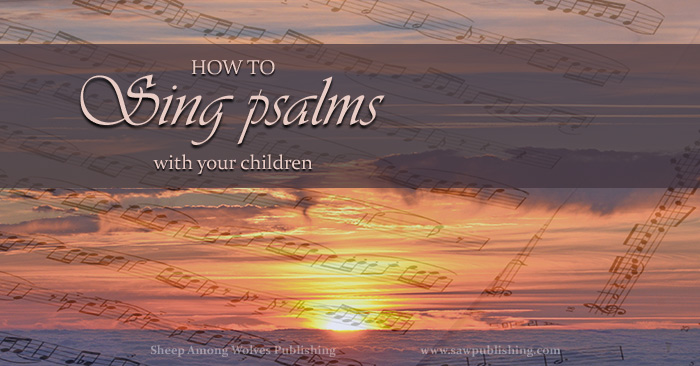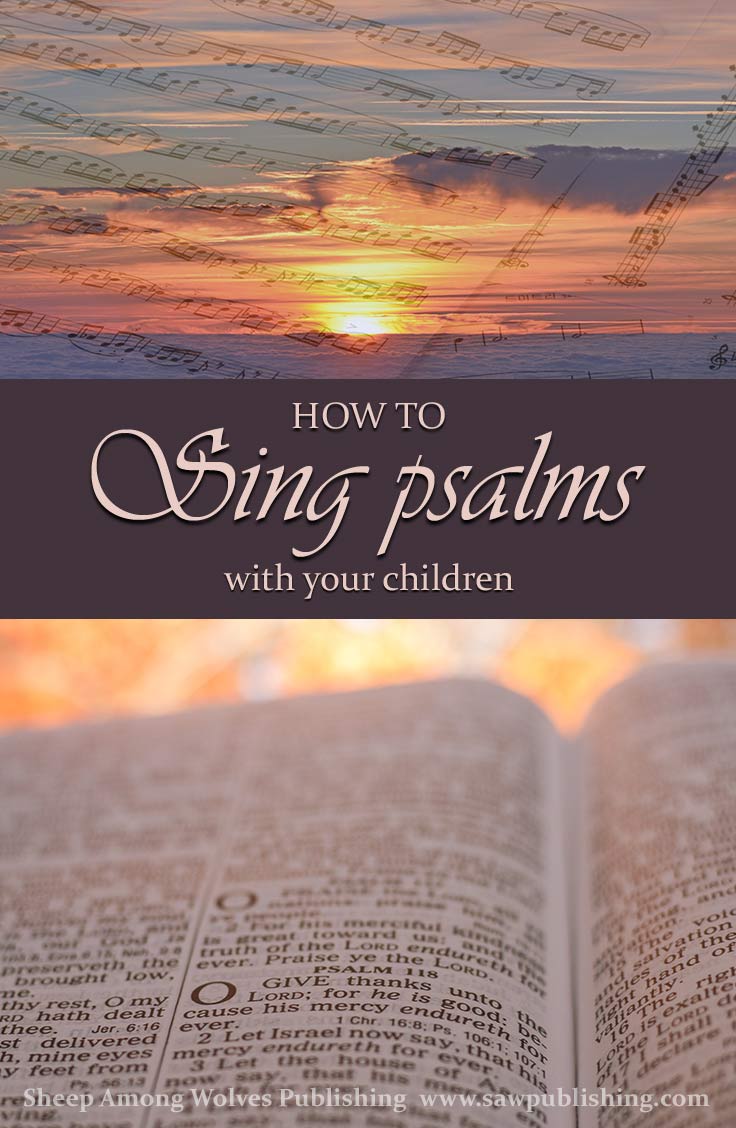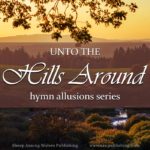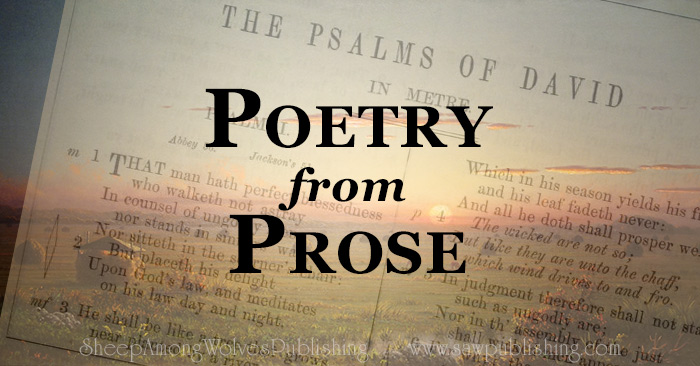How to Sing Psalms with Your Children
 Can you actually sing psalms with your children? I mean, obviously the Israelites sang them in the Old Testament—come to think of it, people still sang them in the New Testament—but today, in the 21st century? Maybe a high-level choir could manage the task, but what about a family who struggles to get through a moderately complicated hymn?
Can you actually sing psalms with your children? I mean, obviously the Israelites sang them in the Old Testament—come to think of it, people still sang them in the New Testament—but today, in the 21st century? Maybe a high-level choir could manage the task, but what about a family who struggles to get through a moderately complicated hymn?
I’ll have to admit, writing this post has raised some questions in my own mind about whether or not traditional psalm singing (and/or chanting) is quite as impossible a feat as we sometimes imagine. But regardless of how difficult you’d find it to sing psalms right out of the text, anyone who is comfortable with very simple hymn arrangements is ready to sing psalms from a metrical version.
Metrical psalms are simply psalms turned into poetry—meterized is another word for the process. The widely-sung numbers “The Lord’s My Shepherd” and “All People That On Earth Do Dwell,” both of which can be found in virtually any hymnal, are classic examples.
Prose Psalms vs. Metrical Psalms
Metrical psalms indisputably fall short of the original prose psalms they mirror. Man’s best unassisted efforts simply do fall short of Divine Inspiration. Metrical psalms are not Scripture. They cannot be taken as such, and they should not be taken as such. As a skilled psalm meterizer himself observed:
“It is impossible to engage in this work without feeling that it is a mistake to twist into rhyme the beautiful prose of the original, and that it is best to sing the Psalms without alteration.” – John Campbell, Marquis of Lorne, The Book of Psalms: Literally Rendered in Verse, 1877
John Campbell still chose to publish his metrical psalter—probably realizing that regardless of the ideal situation, most congregations would not take up the practice of singing, or chanting, entire prose psalms. Metrical psalms are much easier to sing (at least in our current setting and culture), and it is here that their strength lies. Metrical psalms can be sung as easily as a hymn. They are, in fact, psalms turned into hymns. Most congregations, most families, even most children, are capable of learning a simple hymn.
Where Do You Find Metrical Psalms?
Various collections of metrical psalms have been published over the last 400 years. A few of the most widely-used are listed below. Click on the title to go to a full FREE edition of each work:
- Scottish Psalter of 1650
- Tate and Brady’s New Version of the Psalms of David
- Isaac Watt’s Psalms of David
- The Book of Psalms Literally Rendered in Verse
Please note that these collections are listed as a resource. I have personally enjoyed singing psalms from all four collections, but Sheep Among Wolves Publishing is not offering a comprehensive review or recommendation of these works, either in terms of content or spiritual accuracy. Please use personal discretion.
 How Do You Sing Metrical Psalms?
How Do You Sing Metrical Psalms?
If you’ve taken a look at any of the collections listed above, you may have noticed that none of them contain musical scores. One of the traditional features of metrical psalm singing has been the versatility of making independent tune choices.
Metrical psalms are analysed by their metre, which may be written by giving the number of syllables in each line, separated by a dot, for example: 8.6.8.6. You will usually find this number printed in small text somewhere beneath the title, or above the musical score, in any hymnal. In addition, most hymnals contain a metrical index at the back, in which tunes are arranged by metre.
Instead of this numerical “code”, you will frequently see the following letters: C.M. (Common Metre, or 8.6.8.6.), L.M. (Long Metre, or 8.8.8.8.), and S.M. (Short Metre, or 6.6.8.6.). The letter D added after any of these means that the metre is doubled – for instance: C.M.D. = 8.6.8.6.8.6.8.6. (Certainly a long string of numbers to print at the head of the page!)
Psalter compilers have frequently committed to including one C.M. rendition of every psalm, in addition to any other versions included, and this has doubtless helped to solidify the 8.6.8.6. metre as the “common metre” of sacred verse.
Where Do You Find Psalm Tunes?
While it is possible to take your tunes directly from a hymn book, the more common, as well as less confusing, custom has been to publish collections of music without text as companion volumes to the metrical psalters.
One such collection on the market today is The Psalms of David in Metre: A Supplement. Our family used this book, along with the 1650 Scottish Psalter, during our singing time at family worship, to work through the whole psalter one year. I still feel the benefit of being familiar with the vast number of C.M. tunes we were introduced to during that project—many of which you will meet with again and again in any standard hymnal.
Online Musical Scores
If you prefer downloading sheet music one tune at a time, you can access a huge collection of FREE musical scores through the metrical index of Cyber Hymnal. They happen to offer 463 tunes for C.M. alone! The only slight complication to this process is that the index is linked to the recording downloads, rather than the sheet music.
If you want the sheet music, you have to go to the tune name index, and click on the title of a hymn paired with the tune you want (again, please use personal discretion, as the text pages frequently contain images—usually inoffensive ones, but occasionally containing graphic or scantily-clothed Bible figures). Beside the tune name you will see three download icons, and can choose between an audio file, a PDF, and a NoteWorthy Composer file. Slightly complicated, but it does work!
Learning to Sing Psalms is Worth It!
There was a time when it was common practice for the English-speaking church to sing psalms. Certain denominations still print whole or partial psalters in their hymn books. Nevertheless, the concept of metrical psalms has been fading out of church life in the last two centuries.
Don’t let this valuable resource slip out of your hands! Take the time to sing psalms with your children. It’s time you won’t regret having spent.
Are you looking for more information on the concept of metrical psalms? See our previous post:
You might also enjoy:

Unto the Hills Around, by John Campbell, captures the comfort and beauty of Psalm 121 in a faithful meterization which is easily memorized and sung.

Timeless Tips from Homemakers of the Past is a great place to find encouragement as a keeper at home, as you follow in the steps of many who have gone before.

Do you recognise the value of good and great hymns, but aren’t sure how to make them part of your life? You find out that the task isn’t always as difficult as it looks!

